当前位置: Language Tips> Focus 专题> 2016奥运会> 双语奥运
菲尔普斯8日亮相里约即带领美国队夺得男子4x100米自由泳接力赛冠军。外媒更注意到他颈、肩和背上的“圆形瘀伤”,其实是拔罐造成的红印。原来不少美国运动员,如体操选手拿度亚(Alex Naddour),或是泳将库格林(Natalie Coughlin)都有拔罐的习惯,以消除肌肉疲劳。
原来,拔火罐已经跟随奥运选手走向世界了!
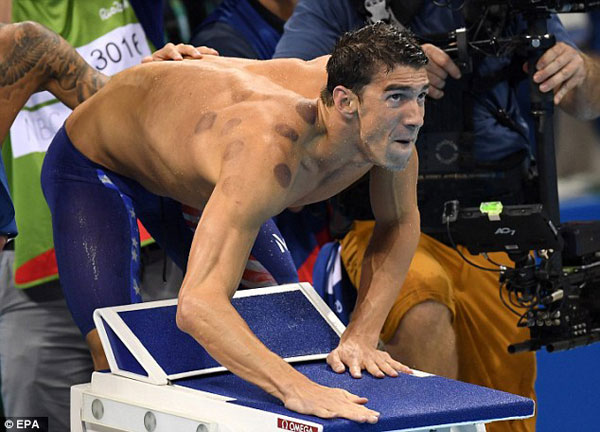 |
|
Michael Phelps showed off large purple marks on his back as he urged on his team mates during the men's 4x100m Freestyle relay final race in Rio |
Those dark red spots dotting Olympians' shoulders and backs are not cigar burns. They're not perfectly circular hickeys either.
奥运健儿肩膀上和背上那些暗红色的印记可不是被烟头烫的,当然也不是圆形的吻痕。
Viewers watching the Olympics this weekend may have spotted the pepperoni-like bruises on athletes and wondered: What is that?
周末观看奥运会的观众们或许发现运动员们身上有意大利香肠状的印痕,那到底是什么呢?
Olympians at Rio have taken to cupping -- an ancient therapy that have mostly been used in Middle Eastern and Asian countries, especially China.
里约奥运会上的运动员爱上了拔火罐,这是一种古法治疗,在中东和亚洲国家,尤其是中国,十分常见。
The therapy consists of having round glass suction cups that are warmed, then placed on sore parts of the body. The placement of the glass cup creates a partial vacuum, which is believed to stimulate muscles and blood flow, while relieving pain.
这种疗法需要使用高温加热过的圆形玻璃吸杯,把它扣在疼痛的身体部位。这种放置方法会形成部分真空,据说这样能舒展肌肉,促进血液流通,从而缓解疼痛。
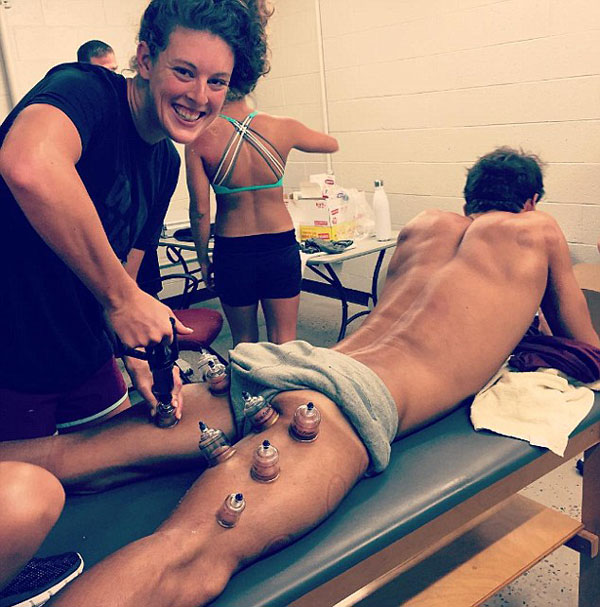 |
|
菲尔普斯接受拔罐治疗 |
Michael Phelps, US gymnast Alex Naddour and Belarus swimmer Pavel Sankovich have all posted pictures of their polka dotted limbs and backs.
迈克尔•菲尔普斯、美国体操运动员艾利克斯•拿度亚以及白俄罗斯游泳运动员帕维尔•桑科维奇都曾经晒过他们有圆点印记的四肢和背部。
Sankovich wrote earlier this summer on his Instagram account: "Cupping is a great recovery tool," with a photo of his thighs covered in suction cups. Former Olympic swimmer Natalie Coughlin has also previously posted pictures of herself going through a cupping therapy.
桑科维奇刚入夏时在Instagram上写道:“拔火罐真是疗伤利器,”配图是一张他扣着吸杯的大腿照片。前奥运会游泳选手娜塔莉•考芙琳之前也发过她拔火罐的照片。
It's not the first time cupping has made the rounds. Celebrities like Jennifer Aniston, Gwyneth Paltrow and Jessica Simpson have all been spotted with the marks in previous years.
拔火罐流行起来,这也不是第一回了。之前,詹妮弗•安妮斯顿、格温妮丝•帕特洛以及杰西卡•辛普森等明星都拔过火罐。
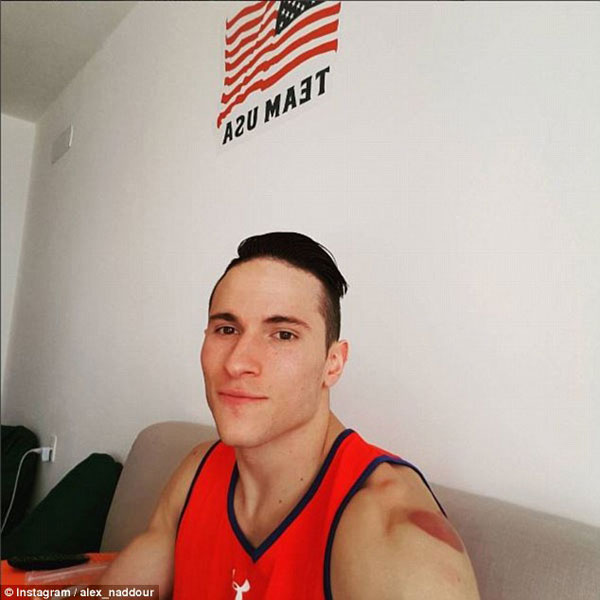 |
|
美国体操运动员艾利克斯•拿度亚肩上的红色拔罐印记 |
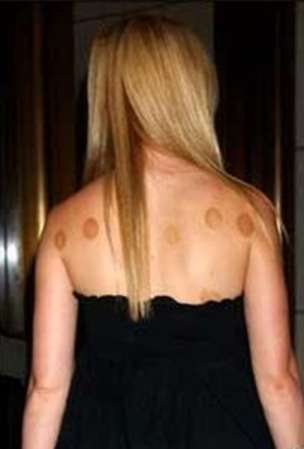 |
| 2004年,格温妮丝•帕特洛后背上布满火罐印记 |
Cupping is not new, it's ancient
拔火罐不是什么新时尚,而是老法子
The practice of cupping has been mentioned in ancient Greek and Egyptian texts.
古希腊和古埃及的文献中都提到过拔火罐。
In traditional Chinese medicine, cupping dates back at least 2,000 years, according to a 2012 analysis published in the journal PLOS One. It is believed to restore the flow of "qi" -- the life force.
2012年《公共科学图书馆•综合》期刊上发表的一篇分析论文称,在中医系统中,拔火罐拥有至少2000年的历史。据说,这能帮人补“气”。
In recent years, cupping therapy has been used for people suffering all sorts of ailments including shingles, facial paralysis, cough and difficulty breathing and acne. But cupping is most commonly used to treat pain, according to the analysis.
最近几年,火罐疗法被用于治疗各种病痛,比如带状疱疹、面神经瘫痪、咳嗽、呼吸困难以及痤疮。分析论文指出,火罐最广泛应用于减缓疼痛。
One small study on cupping found that the cupping marks generally fade after two to four days.
一项关于火罐的小型研究发现,火罐印记基本会在二到四天内逐渐消失。
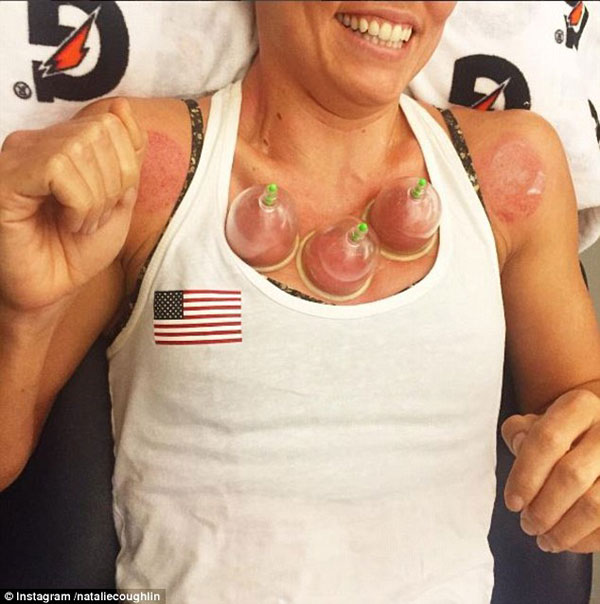 |
|
美国前游泳选手娜塔莉•考芙琳也曾经在社交媒体分享过拔罐的照片 |
Olympians like fads, too
奥运健儿也追逐时尚潮流
Every Olympics seems to have trendy items meant to help athletes, from high-tech swimsuits to the bright kinesio tape that made a scene in the London 2012 games. The tape appears to be back in Rio.
似乎每届奥运会都有帮助运动员的新潮物品,从高科技泳装到风靡2012年伦敦奥运会的肌内效贴布。这次里约奥运会也有运动员使用了这种贴布。
Unlike athletic tape, kinesio tape is thin and pliable, and meant to keep injured joints from bending to prevent further injury. The tape is used to prevent excessive protraction injuries, for example, shoulder problems from activities including playing tennis.
肌内效贴布不是普通的体育运动训练贴布,它很轻薄而且柔韧,用于防止受伤关节弯曲,防止伤情加重。这种贴布能防止过度拉伤,比如打网球等造成的肩膀问题。
But the scientific evidence on kinesio tape is thin, according to a review published in the journal The Physician and Sportsmedicine. Studies showed that it improved pain and range of motion shortly after the injury, but the tape didn't make a difference in the long run.
但是《身体与体育医学》期刊的一篇评论表示,肌内效贴布的科学依据不是很充分。研究表明它能在受伤后短时间缓解伤痛,增大活动范围,但是长期作用不明显。
Vocabulary
hickey:唇印
made the rounds:串门拜访,四处走动
上一篇 : 奥运奖金哪家强?印尼是德国17倍
下一篇 :
关注和订阅


电话:8610-84883645
传真:8610-84883500
Email: languagetips@chinadaily.com.cn